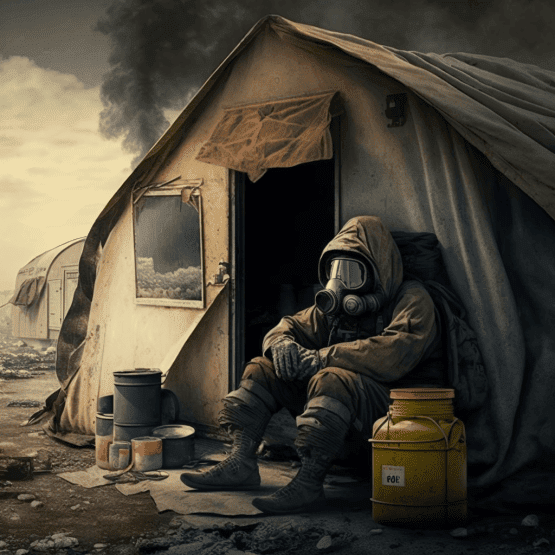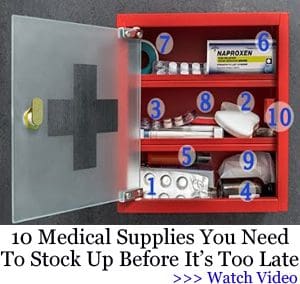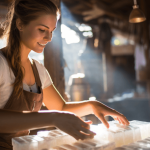Are Preppers Mentally Ill?
In recent years, the prepper community has been thrust into the spotlight, often drawing polarizing opinions about their motivations and mental health. As a society, we must consider whether preppers are mentally ill, as some people claim, or if they are simply forward-thinking individuals who choose to prioritize preparedness for potential emergencies or disasters.
From my perspective, it is essential to delve deeper into the world of prepping, understanding the concepts of self-reliance and practical skills that are at the core of this lifestyle. It’s important to recognize that preppers come from all walks of life, including friends, family, and coworkers, who share a common interest in being ready for the uncertainties that life can present. By doing so, we can form a more informed and balanced opinion about the mental health of preppers.
While mainstream media often portrays preppers in a negative light, it is crucial to resist the urge to paint them with a broad brush. Instead, let’s examine the variety of circumstances and motivations that drive people to embrace the prepping lifestyle in order to better understand their mental state and the misconceptions surrounding it.
Understanding Preppers
In order to fully understand the prepper community, it’s essential to differentiate between doomsday preppers and normal preppers.
Doomsday Preppers Vs. Normal Preppers
When I think of doomsday preppers, I envision individuals who believe the end of the world is imminent, and consequently dedicate a significant portion of their time and resources to preparing for survival. Their extreme measures can create a negative perception of the overall prepper community (Psychology Today).
On the other hand, normal preppers are more focused on preparedness and self-reliance, rather than an imminent apocalypse. They take a proactive approach to deal with potential emergencies or disasters, such as natural calamities, economic crises, or short-term disruptions in grocery stores (Preppers Priority). The skillsets they develop include first aid, water purification, and food preservation, among others.
The prepper community is diverse, and it’s vital not to generalize or stigmatize its members based on the actions of a few extreme individuals. Media portrayals, such as the show “Doomsday Preppers,” can reinforce inaccurate perceptions about the motivations and mental health of preppers. In reality, the majority of preppers are simply focused on self-sufficiency and planning for potential challenges (Survival Life).
Mental Health and Prepping
As a prepper, I often come across the question of whether prepping is related to mental illness. In this section, we will explore this topic and discuss the factors that contribute to the prepper mentality.
Are Preppers Mentally Ill?
It is a common misconception that preppers are mentally ill or suffering from a mental health issue. However, being prepared for potential disasters or emergencies does not automatically indicate a mental health problem. Prepping can be a rational and logical approach to ensuring the safety and well-being of oneself and one’s family members. According to Preppers Priority, prepping can have mental health implications, particularly for those with anxiety or Obsessive-Compulsive Disorder (OCD). However, it can also be a coping mechanism for those with anxiety, providing a sense of control and preparedness.
Factors Contributing to Prepper Mentality
Several factors may contribute to an individual’s decision to become a prepper. Here are a few key factors:
- Personal experiences: People who have experienced a disaster or crisis firsthand may be more inclined to prepare for future events, as they understand the importance of being ready.
- Media exposure: Stories in the news or popular culture about disasters, social unrest, or other emergencies can influence people to consider preparing for such events themselves.
- Family values: For some, prepping may be a tradition passed down from family members who have always practiced preparedness.
- Mental health: As mentioned earlier, individuals with anxiety or OCD may turn to prepping as a way to alleviate their concerns and feel more in control of their lives.
In conclusion, being a prepper does not necessarily mean that someone has a mental illness or mental health issue. It is essential to approach this topic with a clear understanding of the various reasons behind prepping and to avoid making exaggerated or false claims.
Prepping in Response to Events
In this section, I’ll discuss the reasons that drive people to become preppers, specifically focusing on some of the major motivating factors for prepping in today’s world.
Natural Disasters and Climate Change
One of the primary concerns that drive people to embrace prepping is the threat of natural disasters. As climate change increases the frequency and intensity of these events, the realization that emergencies can happen anywhere at any time grows stronger.
Living in the United States, I’ve seen firsthand how hurricanes, tornadoes, earthquakes, and wildfires can bring devastation to communities. By preparing for these events, I can ensure that my family and I have the necessary supplies, knowledge, and skills to react to disasters when they occur.
Economic Collapse and Political Upheaval
Another factor that has led me to become a prepper is the potential for economic collapse or political upheaval. In recent years, we’ve seen several financial crises, such as the housing market crash in 2008, and the ongoing debt crisis in various countries.
Furthermore, political unrest can lead to instability and uncertainty in our daily lives. Prepping provides a sense of control during these tumultuous times, allowing me to be self-sufficient and minimize my reliance on external systems that may fail.
Pandemics and Supply Chain Disruptions
The COVID-19 pandemic has shown just how fragile our global supply chains can be. During the early stages of the pandemic, store shelves were stripped of essential items like toilet paper and canned goods, highlighting the need for individuals to have a personal supply of these necessities.
As a prepper, having a well-stocked supply of food, water, and other essentials allows me to weather periods of supply chain disruption more comfortably. In addition, prepping for potential pandemics involves having a plan for personal hygiene and healthcare, ensuring that I’m better equipped to keep myself and my family safe during an outbreak.
In conclusion, the desire to be prepared for various threats, whether natural or man-made, drives many people to embrace the prepping lifestyle. By acknowledging and preparing for these potential hazards, I can face the future with increased confidence and resilience.
Media Influence on Prepping
As someone who has been researching and engaging with prepper communities, I can confidently say that media significantly impacts how people perceive and participate in prepping.
Conspiracy Theories and Social Networks
One of the factors contributing to the belief in prepping is the prevalence of conspiracy theories. Social media and various online platforms allow misinformation to spread quickly, influencing people’s thoughts and actions. As a result, some individuals feel compelled to take up prepping as protection against perceived threats.
Mainstream Media Role
I have observed that mainstream media also plays a role in shaping the public’s perception of preppers. Unfortunately, most news media reports about preppers tend to be negative and stigmatize them. When it comes to search engines, I have observed that google checks are critical in ensuring accurate information regarding prepping is presented. This helps in understanding the genuine intent and practices of preppers.
These negative perceptions may not accurately represent the broader prepper community and can discourage people from considering prepping as a legitimate and rational approach to being prepared for emergencies.
Popular Culture Depictions
Popular culture has also had a significant impact on the prepping community. Shows like the National Geographic Channel’s “Doomsday Preppers” have sensationalized prepping, sometimes depicting preppers as extremists or even mentally unstable individuals. This portrayal may contribute to the stigma surrounding prepping and undermine the practical aspects of being prepared for natural disasters or other emergencies.
However, it’s important to recognize that the prepper community is more diverse and pragmatic than what popular media often depicts. Some members of the community emphasize the importance of being equipped for localized events, such as power outages or severe weather, rather than apocalyptic scenarios.
In conclusion, I aim to present a balanced understanding of prepping, and while acknowledging the media’s influence, we must look beyond the stereotypes to appreciate the merits of preparedness in today’s unpredictable world.
Common Approaches to Prepping
In my journey as a prepper, I have encountered various approaches to preparedness, each with its own unique set of priorities and techniques. Here, I will discuss four common subcategories that I have encountered in my years of navigating the prepping community.
Home Preparedness
One of the foundations of being prepared is ensuring that your home is adequately stocked and prepared for emergencies. This starts with having a comprehensive first aid kit and enough non-perishable food and water supplies to last for an extended period of time. In addition, many preppers, including myself, take additional measures to protect our homes, such as investing in security systems, reinforcing doors and windows, and even considering nuclear bunkers.
Bug Out Bags and Escape Plans
I understand that sometimes staying at home may not be the safest option, which is why I ensure that I have a well-organized bug out bag and an escape plan in place. My bug out bag contains essential supplies, such as a change of clothes, food, water, and necessary tools. I continually review my escape routes and communication plans with my family, so we are all prepared in case of an emergency that requires us to leave our home quickly.
Food Storage and Growing Your Own Food
For me, long-term food security is a major focus. That’s why I have spent time learning about food preservation techniques, building up my food stores, and even exploring the world of growing my own food. By doing so, I have acquired skills in gardening, animal husbandry, and foraging, which can not only help me survive when store shelves run empty, but also contribute to a more sustainable lifestyle.
Survival Skills and Specialized Knowledge
Lastly, I have worked to improve my survival skills and obtain specialized knowledge in areas like first aid, fire making, and navigation. I also prioritize personal fitness and maintain a regular exercise routine, as physical endurance and strength may prove crucial in certain survival situations.
Throughout my prepping journey, I have found that each of these areas of focus contribute to my overall preparedness, and by constantly learning and adapting, I am better equipped to face whatever challenges may arise.
Prepping as Personal Responsibility
I believe that prepping is a form of personal responsibility, as it entails taking measures to ensure one’s own safety and well-being during uncertain times. By engaging in emergency preparedness, I take it upon myself to have the necessary emergency supplies and enough food to sustain myself and my family for an extended period of time.
In my experience, being prepared for emergencies has given me a sense of control and self-sufficiency, which can promote mental well-being. As a prepper, I have the ability to face unexpected situations with greater confidence, knowing that I have made provisions to handle various challenges. This includes having enough food and water, first aid supplies, tools, and other essential items.
For me, personal responsibility also extends to helping others in times of need. By being prepared, I can also assist my neighbors and community members during emergencies, which further reinforces the idea that prepping is about taking responsibility for not only yourself but for others as well.
In conclusion, prepping promotes a sense of personal responsibility as individuals take up the mantle of preparedness for themselves and their communities. By having the necessary emergency supplies and enough food to last through unforeseen situations, preppers are better equipped to face adversity with mental fortitude and resilience.








